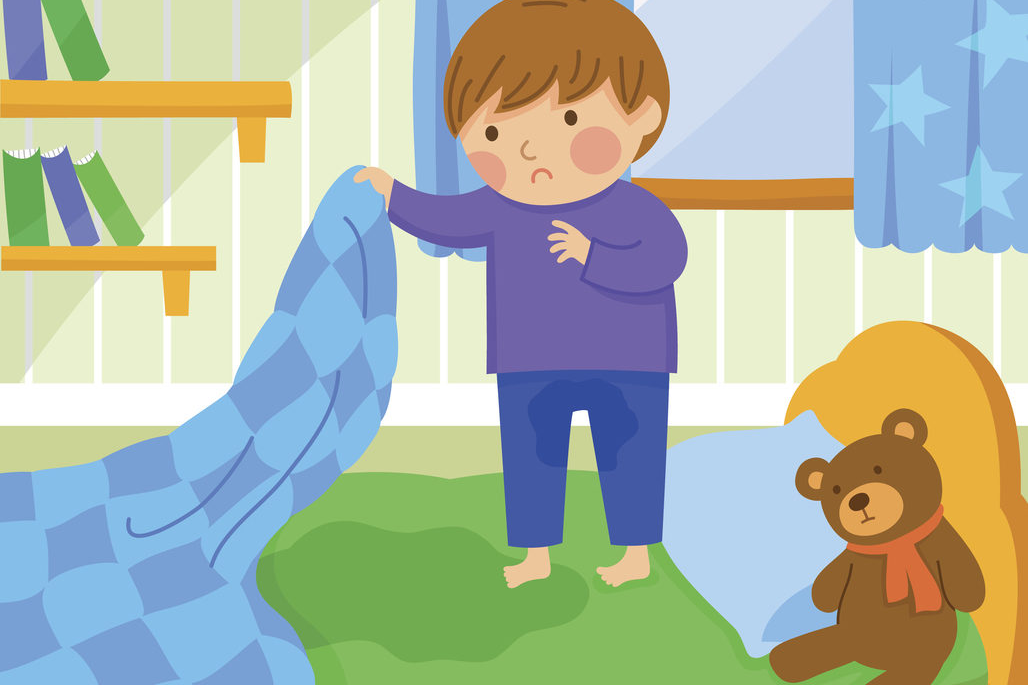Physical Therapy for Bedwetting and Other Urinary/Fecal Accidents
 Amanda Moe
Amanda Moe

Bedwetting as well as urinary and fecal accidents is not an illness! Daytime/night time wetting can be considered more of a normal variation of bladder control rather than a diseased state. According to the International Children’s Continence Society (ICCS), “treatment is not only justified but mandatory.” This is where pediatric pelvic physical therapy comes in. But first let’s take a look at some statistics that show how big of an impact and how common bedwetting and urinary/fecal accidents are in children:
- Urinary accidents affect 15% of girls and 22% of boys
- Boys are 50% more likely to have regular urinary accidents than girls
- 5-7 Million children in the US are affected
- with over 10% continuing to occur after 6 years of age
- 10-25% of bedwetting children also wet during the day
- 10-25% of bedwetting children also have issues controlling their bowel
- IQ tests show children who wet the bed score NO DIFFERENT than other children1
Pediatric Pelvic Physical Therapy is a highly specialized area of rehabilitation that can address urinary/fecal accidents among other things. This type of physical therapy utilizes unique intervention techniques to address any tightness, weakness, or coordination issues present in the pelvic floor and pelvic girdle muscles that are typically impaired and contribute to urinary or fecal leakage. A Pediatric Pelvic Physical Therapist works closely with your pediatrician, urologist, gastroenterologist, or referring physician to normalize urinary/bowel habits, reduce urinary/fecal accidents, and reduce medications utilized to restore bowel and bladder functioning.
Here is brief list of typical interventions utilized at pediatric pelvic physical therapy to treat bed wetting as well as urinary/fecal accidents:
- Myofascial Release - Manual therapy techniques to abdominal and pelvic girdle muscles that can tighten up or spasm and contribute to urinary or fecal retention which can eventually lead to leakage
- Postural Education - Teaching patient’s “Proper Peeing/Pooping Posture” to ease and assist with complete evacuation of bladder and bowels
- Breath Work - The diaphragm (muscle that assist with controlling breathing) and pelvic floor muscles work together to generate pressure, relax anal/urethral sphincters, and lengthen the pelvic floor muscles when urinating or having a bowel movement. These are often uncoordinated in children with fecal or urinary leakage
- Coordination Exercises - The pelvic floor muscles surround the urinary/anal openings and play and important role in having a maintaining continence.
- In children that have constipation, they are often uncoordinated—i.e. the child is squeezing these muscles instead of relaxing them when attempting to pass a bowel movement. Coordination exercises can re-train these muscles to function as they should and thus improve constipation
- In children with urinary or fecal leakage not associated with constipation, these muscles can be uncoordinated and weak, thus contributing to urinary or fecal leakage. Coordination exercises can re-train these muscles to function as they should and thus improve accidents
- Therapeutic Exercises - This is a large category of interventions that are utilized in treating children with urinary or fecal accidents. This includes strengthening the pelvic floor muscles (surround the anal/urinary openings) as well as other muscles of the pelvic girdle that support the abdominal and pelvic region. Exercises can include pelvic floor squeezes while running, jumping, playing as well as other exercises tailored to each individual child and when the leakage is occurring.
If your child is experiencing day- or night-time wetting as well as regular urinary or fecal accidents we are here to help you! For information on how to schedule an evaluation at Restorations PT to see if your child would benefit from Pediatric Pelvic Physical Therapy, please call 412-206-9202. Amanda Moe, DPT, PRPC, is available for morning and after school appointments. Also, for more information on what to expect for a Pediatric Pelvic Physical Therapy evaluation, please see the blog Pedi-Pelvic Rehabilitation: Visit #1 for Children.
**Disclaimer: It is important to communicate these issues to your pediatrician (or pediatric gastroenterologist, urologists, etc) so they are able to rule out any other cause of urinary or fecal leaks. Amanda works closely with your pediatrician updating them on progress made in pediatric pelvic physical therapy and would be happy to speak with your pediatrician or physician at your request.
1All statistics listed above from: Austin, P., Bauer, S.B., Bower, W., et al. The standardization of terminology of lower urinary tract function in children and adolescence: update report from the standardization committee of the international children’s continence society. J Urol (2014) 191.
photo credit: iStock.com/yelet
